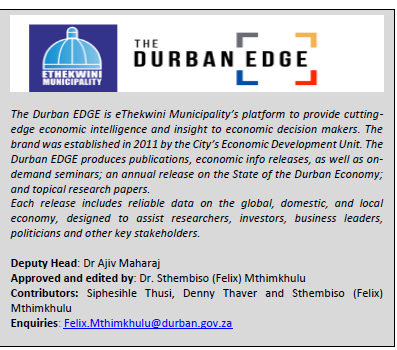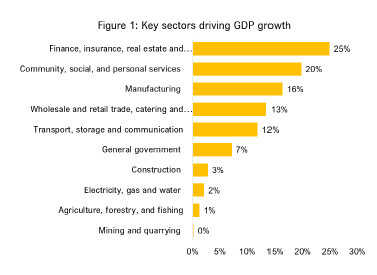

Thekwini Municipality is South Africa’s third-largest metropolitan economy, contributing approximately 60per cent of KwaZulu-Natal’s GDP. With a population of 4.2 million and a diverse economic base comprising 40,000 formal businesses and 10,000 informal enterprises, the city plays a pivotal role in the provincial and national economy.

In Figure 1 above, tourism stands out as a critical sector, directly and indirectly contributing 25per cent to the city’s GDP, which averages R377.4 billion annually. Despite global challenges, including the COVID-19 pandemic, eThekwini has demonstrated resilience, with GDP growth projected at 0.9 per cent in 2025 and 1.4 per cent in 2026.
The tourism sector’s impact extends beyond its direct contributions, acting as a catalyst for broader economic activity. Core tourism sectors, including hotels, restaurants, retail, and transport, account for 13 per cent and 12 per cent of GDP, respectively. Indirectly, tourism supports 61 per cent of the economy, benefiting community services (20 per cent), manufacturing (16 per cent), and finance and real estate (25 per cent).
This multiplier effect means that every rand spent by a tourist generates three times more value across the economy. Recent data highlights this dynamic: King Shaka International Airport recorded 2.5 million arrivals in 2024, a significant recovery from the pandemic lows, though still below the pre-COVID peak of 3.1 million. Tourist spending has grown at an average annual rate of 9.5 per cent over the past five years, reflecting strong demand and the sector’s potential for further expansion.

Employment trends further underscore tourism’s importance. The city’s workforce totals 1.3 million, with 61,237 jobs added in 2024. Notably, women accounted for 93 per cent of these new jobs, while youth employment represented 58 per cent of the total. Key sectors driving job creation, community services (22 per cent), finance and business services (19 per cent), and manufacturing (16 per cent) are closely linked to tourism activity. Despite these gains, challenges remain, including a slowdown in job growth in early 2025 and a concerning number of discouraged workers. However, business confidence remains above the neutral 50-point threshold, signalling sustained optimism among investors and entrepreneurs.
In conclusion, tourism is not just a standalone sector but a vital thread that weaves together eThekwini’s economy. Its far-reaching linkages with manufacturing, finance, and community services make it indispensable for inclusive growth and job creation. Strategic investments and policies aimed at revitalising tourism, such as enhancing infrastructure, marketing the city as a premier destination, and supporting small businesses, will be crucial for unlocking its full potential and ensuring long-term economic resilience.